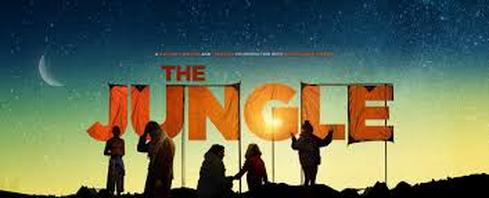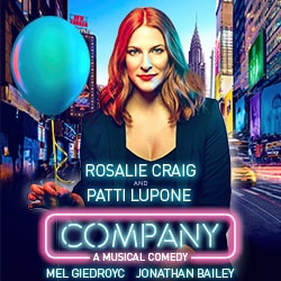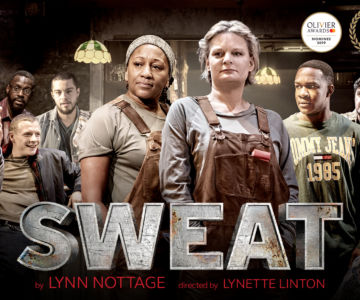 The Jungle: London’s Best New Play Will and Should Break Your Heartby Randi / October 4, 2018
The Jungle: London’s Best New Play Will and Should Break Your Heartby Randi / October 4, 2018Not to sound too much like Stefan, but London’s hottest show right now is ‘Company’. It’s got everything: gorgeous sets, impeccable lighting, that IKEA chair everyone has that looks expensive, Patti LuPone, red dresses, untz-untz-untz music, a guy sitting next to you (me) burping up cheese (I almost vomited in front of Patti LuPone), and, most notably, a gender-switched lead character. In this modern revival of Stephen Sondheim’s classic 1970 musical, Bobby, the 35-year-old bachelor who enjoys juggling women and being the envy of his married friends, is now Bobbie, a 35-year-old bachelorette who dates and has lots of married friends and is thinking a bit about what she wants out of life. The buzz around this revival is off the charts, and yet the show itself lacks any sense of life driving it forward.
Maybe it’s because I am in Bobbie’s demographic, so I have lots of Bobbie-friends in my life who are Living Their Best Life, but I think I found the female characterization of Bobbie less compelling than the male. Stereotypically, women think about marriage and getting to spinster age more than men do, right? Older single men are more socially acceptable than older single women, because yay misogyny. So if this is true, a female Bobbie isn’t anything of note. It’s merely a woman who still has her entire life ahead of her thinking, hmm maybe do want to get married someday. COOL. That’s not exactly the most compelling dramaz. Whereas, with a male Bobby, especially when he’s played with a little coldness towards his romantic conquests, it feels a little more moving to watch him realize that maybe he wants to settle down one day, because it wasn’t expected, and he’s not expected to really care about that. Bobby having an emotional journey is more compelling than Bobbie, well, just staying the same.
And maybe I found the female Bobbie less compelling because it wasn’t acted well. Unfortunately, I saw this show on the night when the lead, Rosalie Craig, was sick, and Jennifer Saayeng, who usually plays Jenny, was on as Bobbie. Saayeng should be commended for getting through the show without any mistakes, but this is a West End professional production, and her performance was sadly not up to standards. She seemed unable to control her breath, which resulted in weak voice, unable to be sustained. It was a shame that Bobbie’s big musical moments – “Marry Me A Little”, “Someone is Waiting”, and of course “Being Alive” – were laborious, tedious, awkward moments that you yearned to be over instead of relishing. It was a big disappointment, and I’m shocked that a production of this caliber doesn’t have a better suited standby for Bobbie. Her acting portrayal left me cold as well, so perhaps Craig does show Bobbie as going on an emotional journey, but Saayeng did not. It’s the fault of the director, Marianne Elliot, for not ensuring that that necessary journey always remains a part of the show no matter who is playing the role, and it’s the fault of the producers for not having a standby or understudy ready to portray it. When I last saw ‘Company’ live, it was the 2006 Broadway revival with Raul Esparza, and his Bobby was one of the most incredible performances I’ve ever seen in my entire life. People say that Bobby/Bobbie doesn’t require a powerhouse vocalist, but hell if hearing Raul blow the roof off the theatre with his definitive ‘Being Alive’ didn’t transform the entire emotional message of that song and subsequently the play as a whole. He actually felt the pressure from his married friends and was grappling with his own desires, whereas in this production, I didn’t notice anyone making Bobbie feel uncomfortable with her status at all. And for good reason – like I said, she seemed to be doing fine. But the whole point of a musical is to show emotion through song, which Bobbie did not do.
Aside from Bobbie, the rest of the characters were mostly great. ‘Company’ is told through a series of vignettes in no apparent chronological order, with returns to Bobbie’s surprise 35th birthday party scattered in here and there and as bookends. The first of Bobbie’s married friends were wonderful – Mel Giedroyc and Gavin Spokes as Sarah and Harry, who are trying to give up their vices and end up fully fighting each other while ‘demonstrating’ jujitsu, which Giedroyc hilariously pronounces like Ross Gellar says ‘karate’. Some of my favorite comic timing in ‘Company’ comes when Joanne enters the fray and sings to the audience “The Little Things You Do Together”, and Patti did exactly what was needed here, hysterically. The scene, which ends with the lovely-sad “Sorry-Grateful”, was as pitch-perfect as the set design was. Jenny and David, the couple who smokes weed with Bobbie and has some truly provocative dialogue, were also great. Jamie Pruden was on as Jenny with Saayeng swung up to Bobbie, and I honestly couldn’t believe that she wasn’t the regular Jenny. She and her husband, played by an affable Richard Henders, seemed perfectly suited to their parts. Lastly, Daisy Maywood and Ashley Campbell as Susan and Peter were great as well, with their interesting portrayal of a couple that is finally happy with each other once they get divorced.
But no one and nothing in the shows beats Bobbie’s gay friends Jamie and Paul. Jonathan Bailey stops the show and steals it with his incredible “Getting Married Today”, which is honestly the best reason to see this show. This is the one gender switch in the production that makes much more sense now. When a woman sings this song, it’s funny but just normal cold feet. With a man singing it, his jab of “Just because we can get married doesn’t mean we should” takes on a much more potent meaning, and his joke about being pregnant is actually funny. The staging is just as good as his performance, down to his leap onto the kitchen counter and the choirgirl disappearing into the fridge. It’s a tour de force and I will bet right now that Bailey wins an Olivier this year for it.
While Richard Fleeshman’s Andy, the idiot flight attendant formerly known as Amy, is fantastic, the other two boyfriends don’t fare as well. Theo (formerly Kathy) barely makes a dent, while PJ (formerly Marta) is so poorly redone as to be kind of maddening. Before, Marta was this cool liberal girl who revels in the city’s diverse wonders, but PJ seems to be just like some skanky Brit who spends all his time doing drugs in clubs. What this production does to “Another Hundred People” is a crime.
And Patti, while always great, didn’t really connect to the character. Maybe it’s because she doesn’t have to – the audience, screaming and cheering for her every single word, no matter what it was, would apparently scream and cheer for her if she said eat my farts instead of her lines. Joanne’s big song “Ladies who Lunch” is set in a modern club with house music thumping, which as you know is my nightmare, and there’s just no way this old lady would be at this club with all these young people dancing. The new book scenes given to Joanne before and after her big song are honestly weird. Whatever they were trying to accomplish by shocking Bobbie with Joanne’s untoward suggestions about sleeping with her husband &c. was not achieved. Instead, you’re left just kind of giving the stage the side-stink-eye like that gif of the little blonde toddler. If I am forced to give it some weight, I guess Joanne was trying to scandalize Bobbie into feeling something at all, and betting that her reaction would be the realization that she wants to settle down, but it felt unnatural and actually bizarre.
Sondheim has said that he hates hearing theories that Bobby was a gay man, because that’s an entirely different issue that the character would be dealing with. Bobby’s story is that of the quintessential straight white man with no real problems, and this is the one case I can think of where the story is best suited to that kind of man. Making him a woman diminishes the potency of his story the same way Sondheim feared making him gay would. And Bobbie doesn’t seem to have a problem here at all. Her friends don’t seem to be pressuring her to settle down as they seem to have in past productions. And you’d think that the gender-switch would bring along a new kind of pressure from the friends and from Bobbie’s own acknowledgement of her aging – the time she has left to have babies. I assumed this production would be all over that with a female Bobbie. But this obvious issue is left strangely unmentioned, the one thing that actually would make a compelling argument for a female lead. So, instead of the story of a cold, insular, lonely man who realizes how badly he wants someone to love him, we see the story of a middle class, mid-30s woman who has lots of friends, a great apartment, an active romantic life, and a birthday cake all to herself. I don’t see a problem.
INFORMATION
‘Company’ is playing at the Gielgud Theatre until December 22, but I am positive that either an extension or a Broadway transfer is coming, given the hugely positive reception it’s getting. Rush tickets are available on TodayTix.





